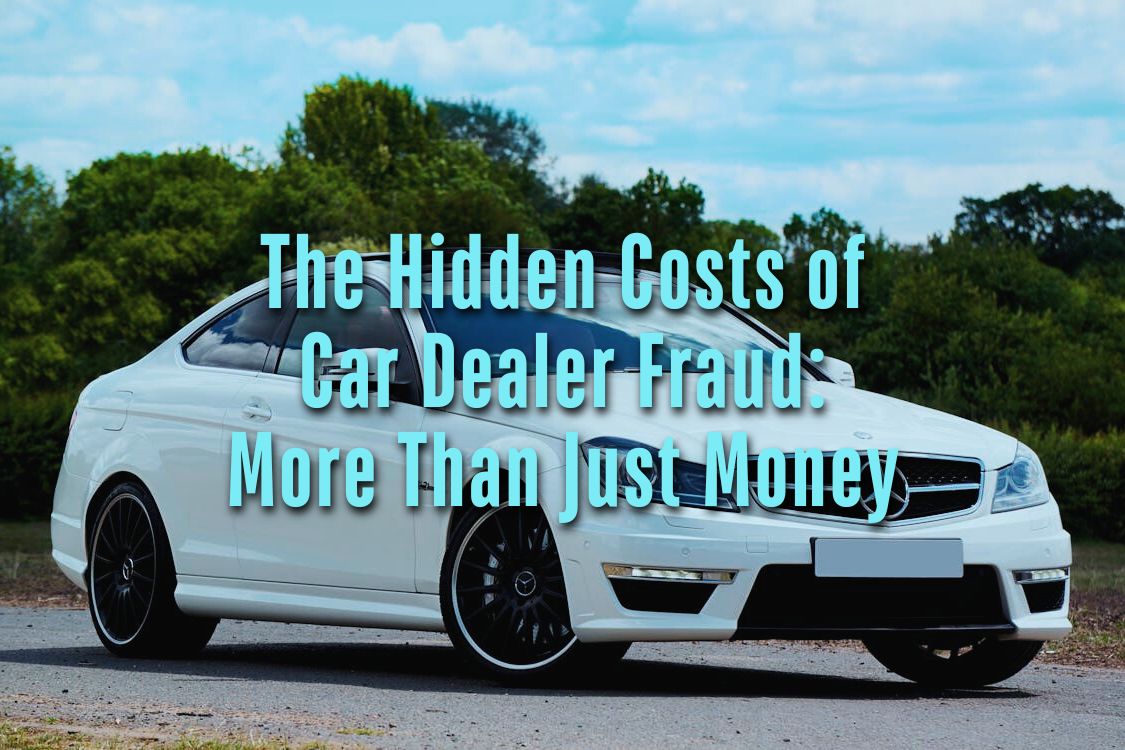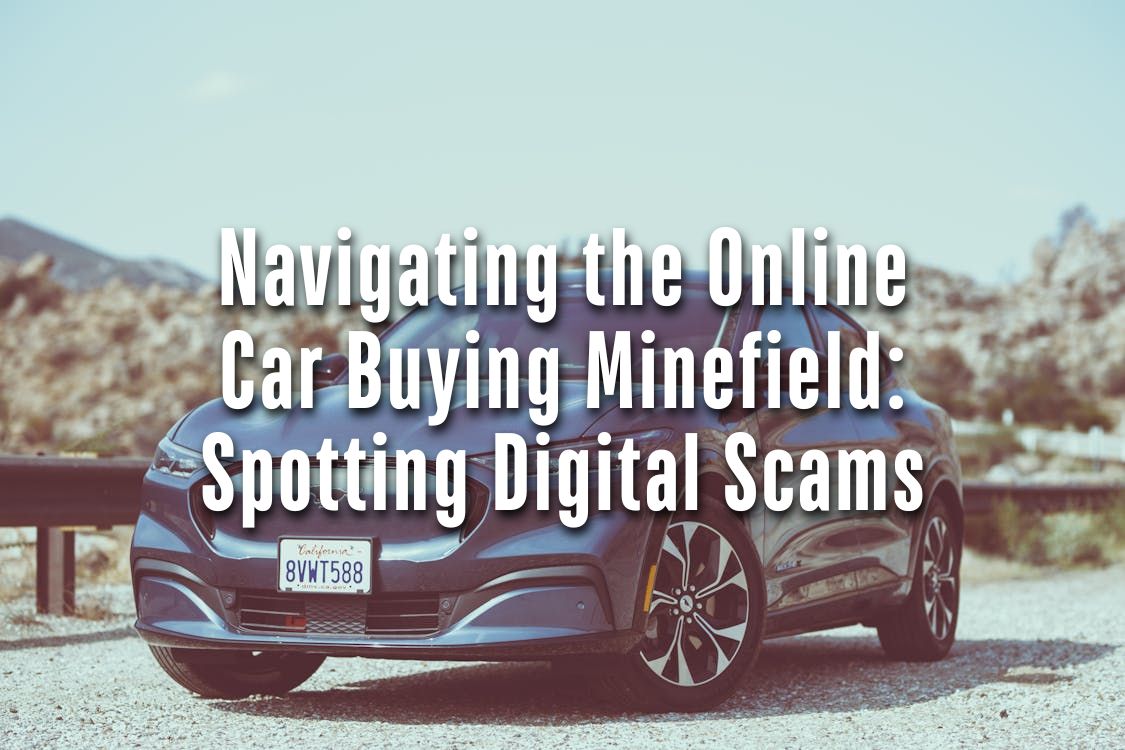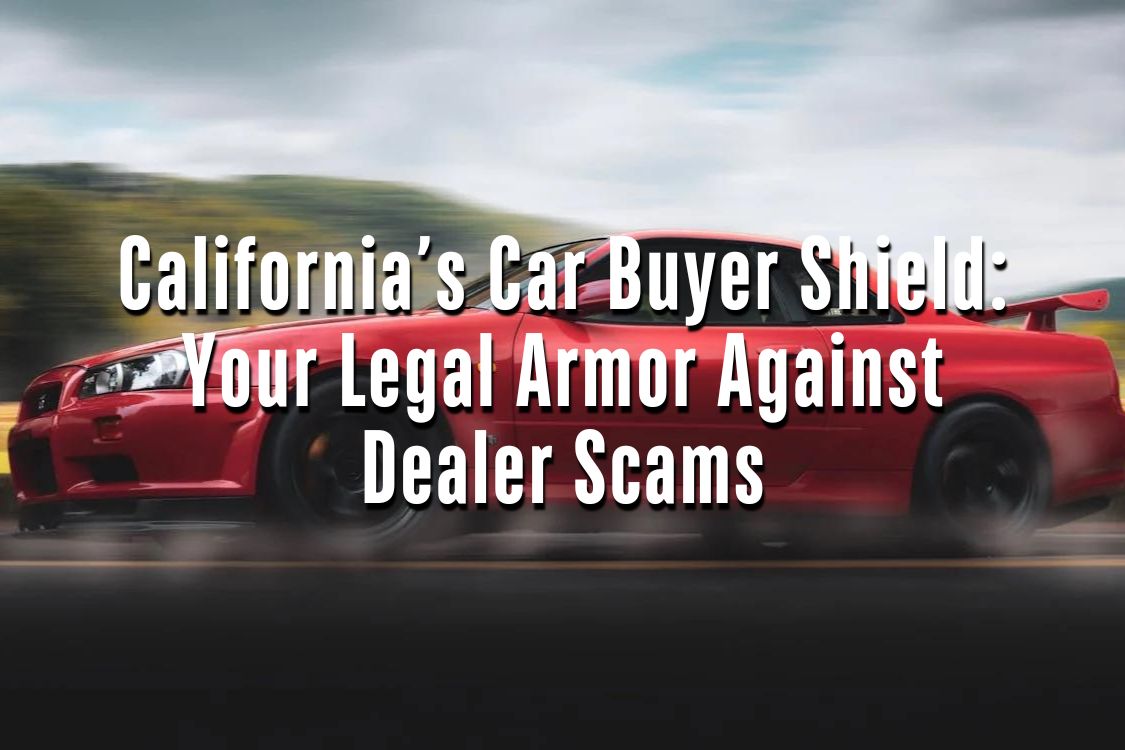
Buying a car should be exciting, but sometimes it turns into a nightmare. Imagine driving off the lot in your “perfect” car, only to find out later that things aren’t what they seemed. Maybe the engine starts making weird noises, your monthly payments are higher than you agreed to, or you spot damage that wasn’t there before. Suddenly, your dream car feels more like a lemon.
If this sounds familiar, you might be a victim of auto dealer fraud. It’s a big problem that affects many car buyers in California and across the country. But here’s the good news: you don’t have to just accept it.
In this article, we’ll pull back the curtain on shady car dealer tricks and show you how to protect yourself. We’ll explain your rights as a consumer and how to take action if you’ve been wronged. Whether you’re shopping for a car or dealing with a bad purchase, we’ve got your back. Let’s dive in and learn how to spot the lies, stand up for your rights, and get the fair deal you deserve.

Common Car Dealer Scams: Know What to Watch For
Lying About a Car’s Condition: Don’t Be Fooled by a Pretty Paint Job
Some sneaky dealers try to hide a car’s true condition. They might tell you a car is in great shape when it’s actually been in accidents or has serious problems. Here’s what to watch out for:
- A dealer says the car is “like new” or “in perfect condition,” but it’s actually been in a crash or has major mechanical issues.
- They show you a clean vehicle history report, but it might be fake or not tell the whole story.
- The car looks shiny on the outside, but they’re hiding frame damage or other big problems.
Remember, just because a car looks good doesn’t mean it is good. Always get a trusted mechanic to check out a used car before you buy it. This can save you from ending up with a lemon that looks like a cherry.
Odometer Fraud: When the Miles Magically Disappear
Ever heard of a car that seems to age backward? That’s what some dishonest dealers try to pull off with odometer fraud. Here’s the lowdown:
- Dealers mess with the odometer to show fewer miles than the car has actually driven.
- This makes the car look less used and more valuable than it really is.
- It’s an old trick, but it still happens, especially with older cars.
Digital odometers have made this scam harder, but not impossible. Some crafty folks have found ways to fiddle with these too. So, don’t just trust the number on the dashboard. Here’s what you can do:
- Check the car’s service records and history report.
- Look for wear and tear that doesn’t match the mileage.
- If something feels off, trust your gut and dig deeper.
Remember, a car with suspiciously low miles for its age might be too good to be true. Stay alert, and you’ll avoid getting taken for a ride!
Lemon Laundering: When Bad Cars Get a Fresh Coat of Paint
You’ve heard of money laundering, but what about car laundering? It’s a sneaky trick some dealers use to sell you a car with a secret troubled past. Here’s how it works:
- In California, car makers have to buy back cars with big, unfixable problems. We call these “lemons.”
- Some shady dealers buy these lemons cheaply.
- They do quick, surface-level fixes to make the car seem okay.
- Then they sell it to you without mentioning its history of problems.
It’s like putting a band-aid on a broken arm and calling it healed. These cars often still have serious issues that’ll pop up later, leaving you with a big headache (and repair bill).
To protect yourself:
- Always ask for a detailed vehicle history report.
- Look for any signs the car was bought back by the manufacturer.
- If the deal seems too good to be true, it probably is.
Remember, a fresh paint job can hide a lot of problems. Don’t let a polished lemon leave a sour taste in your mouth!
The Old Bait and Switch: Don’t Fall for the Fake Deal
Ever feel like you’re chasing a mirage when car shopping? That’s the “bait and switch” trick in action. Here’s how it works:
- A dealer advertises an amazing deal on a car. Great price, cool features – it seems perfect!
- You rush to the dealership, excited to snag this sweet ride.
- Surprise! They tell you that the car just sold. What bad luck, right?
- But wait! They have something “even better” to show you. It’s usually pricier or loaded with extra fees.
It’s like going fishing for tuna and coming home with an overpriced goldfish. This trick plays on your excitement and disappointment to push you into a worse deal.
How to avoid getting hooked:
- Call ahead to confirm the advertised car is still available.
- If it’s not there when you arrive, be ready to walk away.
- Don’t let them pressure you into a different car you didn’t plan for.
Remember, a good deal shouldn’t disappear the moment you show up. If it does, your best bet might be to disappear too – right out the door!
Financing Tricks: Watch Out for Hidden Money Traps
When it comes to paying for your car, some dealers play sneaky games with the numbers. Let’s break down these financial funhouse mirrors:
Hidden Fees: They might sneak in extra charges you didn’t agree to. Always read the fine print!
Interest Rate Hikes: Some dealers bump up your interest rate and pocket the difference. Shop around for loans to know what’s fair.
The “Yo-Yo” Scam: You drive off happy, but days later they call saying there’s a “problem” with your loan. Suddenly, you’re facing a worse deal. Don’t fall for it!
Unnecessary Add-ons: They might try to pad your loan with extras like extended warranties or GAP insurance. These can be useful, but make sure you actually want and need them.
How to protect yourself:
- Read every document carefully before signing.
- Get loan offers from banks or credit unions to compare.
- Don’t feel pressured to make a decision on the spot.
- Ask for a breakdown of all fees and charges.
Remember, a good deal should be clear and straightforward. If it feels like you need a detective to understand your car loan, something’s probably fishy!
Sneaky Trade-Ins: When Old Car Debt Haunts Your New Ride
Trading in your old car for a new one sounds simple, right? But watch out! Some dealers play a tricky game with your old car’s debt. Here’s the deal:
- You owe more on your old car than it’s worth. That’s called negative equity.
- Some dealers offer to “take care of” that old debt when you buy a new car.
- Sounds great, but here’s the catch: They’re just adding that old debt to your new car loan.
It’s like packing your old suitcase into a new one – you’re still carrying all that weight!
This sneaky move can:
- Make your monthly payments way higher than you expected
- Leave you owing much more than your new car is worth
How to protect yourself:
- Know how much you owe on your old car before you go shopping
- Ask the dealer to clearly show you how they’re handling your trade-in
- If something doesn’t add up, speak up!
Remember, a fresh start with a new car shouldn’t come with old baggage. Don’t let a dealer bury you in hidden debt!
Hidden Price Hikes: When the Sticker Shock Comes Later
You know that price tag on the car window? Some dealers treat it more like a starting point than a real price. Here’s what to watch out for:
- The manufacturer sets a suggested price for the car (that’s the MSRP).
- Some dealers secretly add extra charges on top of this.
- They might not tell you about these markups until you’re ready to buy.
It’s like going to a restaurant where the menu prices are “just suggestions” and your bill is always higher than expected.
Why this matters:
- You could end up paying way more than the car is actually worth.
- It makes it harder to compare prices between different dealers.
How to avoid the markup trap:
- Ask for a detailed breakdown of the price.
- Research the car’s value online before you shop.
- Don’t be afraid to question any charges that seem off.
- Be ready to walk away if the price suddenly jumps.
Remember, a fair deal should be clear from the start. If the price keeps climbing like a mountain goat, it might be time to find a different dealership!
Fake Papers and Forged Signatures: When Dealers Play Dirty
Think all the paperwork at a car dealership is legit? Think again. Some shady dealers take document fraud to a whole new level. Here’s what can happen:
- They might scribble your signature on papers you never saw.
- Your loan application? They could doctor it to make you look richer than you are.
- Some even create totally fake documents to trick you or the bank.
It’s like identity theft, but instead of stealing your info, they’re messing with it to make a sale.
Why this is seriously bad news:
- You could end up with a loan you can’t afford.
- It might mess up your credit score.
- You could be on the hook for things you never agreed to.
How to protect yourself:
- Read every single paper before you sign it.
- Never sign blank documents.
- Double-check all the info on your loan application.
- If something looks off, speak up and ask questions.
Remember, your signature is powerful. Don’t let anyone use it without your okay. If a dealer rushes you through paperwork, that’s a big red flag. Take your time – it’s your money and your future on the line!

The Hidden Costs of Car Dealer Fraud: More Than Just Money
When you fall victim to a car dealer’s scam, it’s not just your wallet that takes a hit. These schemes can mess with your life in ways you might not expect. Let’s talk about the real-world impact of dealer fraud:
Stress Overload:
- Dealing with a scam can keep you up at night worrying.
- You might feel anxious all the time, which can even make you physically sick.
Trust Issues:
- After getting burned once, you might start seeing scams everywhere.
- Shopping for anything becomes a stressful experience.
Credit Score Chaos:
- If the scam involved messing with your credit, your score could take a nosedive.
- This can make it tough to get loans or good rates in the future.
Legal Headaches:
- Fighting back through the courts? Be ready for a long, draining process.
- It can eat up your time, energy, and even more money.
Emotional Rollercoaster:
- You might feel angry, embarrassed, or even depressed.
- These feelings are normal, but they can be tough to handle.
Remember, you’re not alone in this. If you’re feeling overwhelmed:
- Talk to friends and family. They can offer support and maybe even help.
- Consider chatting with a counselor or therapist. They’re pros at helping people through tough times.
- Look for consumer support groups. Talking to others who’ve been there can be a big help.
Don’t let the scammers win by suffering in silence. Reach out for help if you need it. There are people and resources out there ready to support you through this rough patch.

Navigating the Online Car Buying Minefield: Spotting Digital Scams
Buying a car from your couch sounds great, right? But the internet can be a tricky place when it comes to big purchases. Here’s how to spot online car scams and keep yourself safe:
Too Good to Be True Deals:
- Watch out for super-low prices that don’t make sense.
- Scammers often use stolen photos to make fake listings look real.
The Invisible Car Trick:
- Some dealers advertise amazing cars they don’t actually have.
- They’re just trying to get you in the door to sell you something else.
Fake Websites and Emails:
- Scammers create lookalike sites to steal your info.
- Be careful about clicking links or entering personal details.
The Escrow Trap:
- Watch out if they push you to pay through a specific service.
- It might be a fake escrow they control, and your money will vanish.
How to Stay Safe:
- Do your homework on both the seller and the car.
- If a deal seems unbelievable, it probably is.
- Never give out personal info unless you’re 100% sure it’s safe.
- Use trusted, well-known websites for car shopping.
- If possible, see the car in person before buying.
Remember, online car shopping can be convenient, but it requires extra caution. Take your time, trust your gut, and don’t let the excitement of a great deal cloud your judgment. A little skepticism can save you from a big headache!

California’s Car Buyer Shield: Your Legal Armor Against Dealer Scams
If you’re buying a car in California, you’ve got some serious backup. Our state takes protecting car buyers seriously, and we’ve got laws to prove it. Here’s your quick guide to the legal tools in your corner:
The California Consumer Legal Remedies Act (CLRA):
- This law is like a Swiss Army knife for consumers.
- It fights back against lies, hidden info, and other sneaky dealer tricks.
The Lemon Law:
- Stuck with a car that’s always in the shop? This law’s for you.
- It could get you a refund or a new car if yours is a real dud.
Truth in Lending Act:
- This makes sure you know exactly what you’re signing up for with your car loan.
- No hidden fees or confusing terms allowed!
Automobile Sales Finance Act:
- Another layer of protection for your wallet when financing a car.
- It keeps dealers honest about your payment terms.
Fair Credit Reporting Act:
- This one guards your credit info.
- It lets you fight back if someone messes with your credit report.
Remember, these laws are here to help you. If a dealer’s acting shady:
- Speak up! Let them know you’re aware of your rights.
- Don’t be afraid to walk away from a bad deal.
- Consider talking to a consumer protection lawyer if things get messy.
Fighting Back: Your Roadmap to Justice
If you think a car dealer has ripped you off, don’t give up! You have options to fight back. Start by gathering all the paperwork related to your car purchase and document any issues you’re having with the vehicle. Then, talk to a lawyer who specializes in car scams.
They can help you figure out the best way to get justice, whether that’s through negotiation, mediation, or taking the dealer to court.
Remember, you’re not alone in this fight, and there are legal protections in place to help you get the fair treatment you deserve. Here’s your roadmap to justice:
- Gather Evidence: Collect all documents related to your car purchase, including the sales contract, financing agreements, advertising materials, and any communication with the dealer. This documentation will be crucial in building your case.
- Document Vehicle Issues: If your car is experiencing problems, meticulously record all repairs, maintenance visits, and any issues you encounter. This documentation will help prove the car’s defects and the dealer’s failure to disclose them.
- Consult an Auto Fraud Attorney: Seek legal counsel from an attorney specializing in auto fraud. They can assess your case, explain your rights under California law, and guide you through the legal process.
- Consider Alternative Dispute Resolution (ADR): In some cases, you may be able to resolve your dispute with the dealer through mediation or arbitration. An attorney can advise you on whether ADR is a suitable option for your case.
- File a Lawsuit: If negotiations or ADR fail, you may need to file a lawsuit against the dealership. Your attorney will handle all aspects of the litigation, including drafting the complaint, conducting discovery, and representing you in court.
Why Choose Consumer Action Law Group for Your Auto Fraud Case
Dealing with auto dealer fraud can be overwhelming, but you don’t have to face it alone. At Consumer Action Law Group, we specialize in helping consumers like you fight back against unfair practices. Here’s why we’re well-equipped to handle your case:
Free Case Review:
- We offer a no-cost, no-obligation consultation.
- Share your situation, and we’ll advise if we can help.
No Upfront Fees:
- We work on a contingency basis.
- You only pay if we win your case.
We Cover Initial Costs:
- Don’t worry about legal expenses.
- We handle all upfront costs related to your case.
Strong Representation:
- We’re committed to pursuing your claim vigorously.
- Our goal is to secure the maximum compensation you deserve.
Our team understands the stress and financial burden of auto fraud. We have the experience and knowledge to navigate these complex cases effectively. With Consumer Action Law Group, you’ll have dedicated legal professionals working to protect your rights and seek justice.
Remember, you have options when facing auto dealer fraud. Let us put our expertise to work for you and help you resolve this challenging situation.
Call us at (818) 254-8413 or visit our website to schedule your free consultation. We’re here to help you reclaim your peace of mind and get the compensation you deserve.









